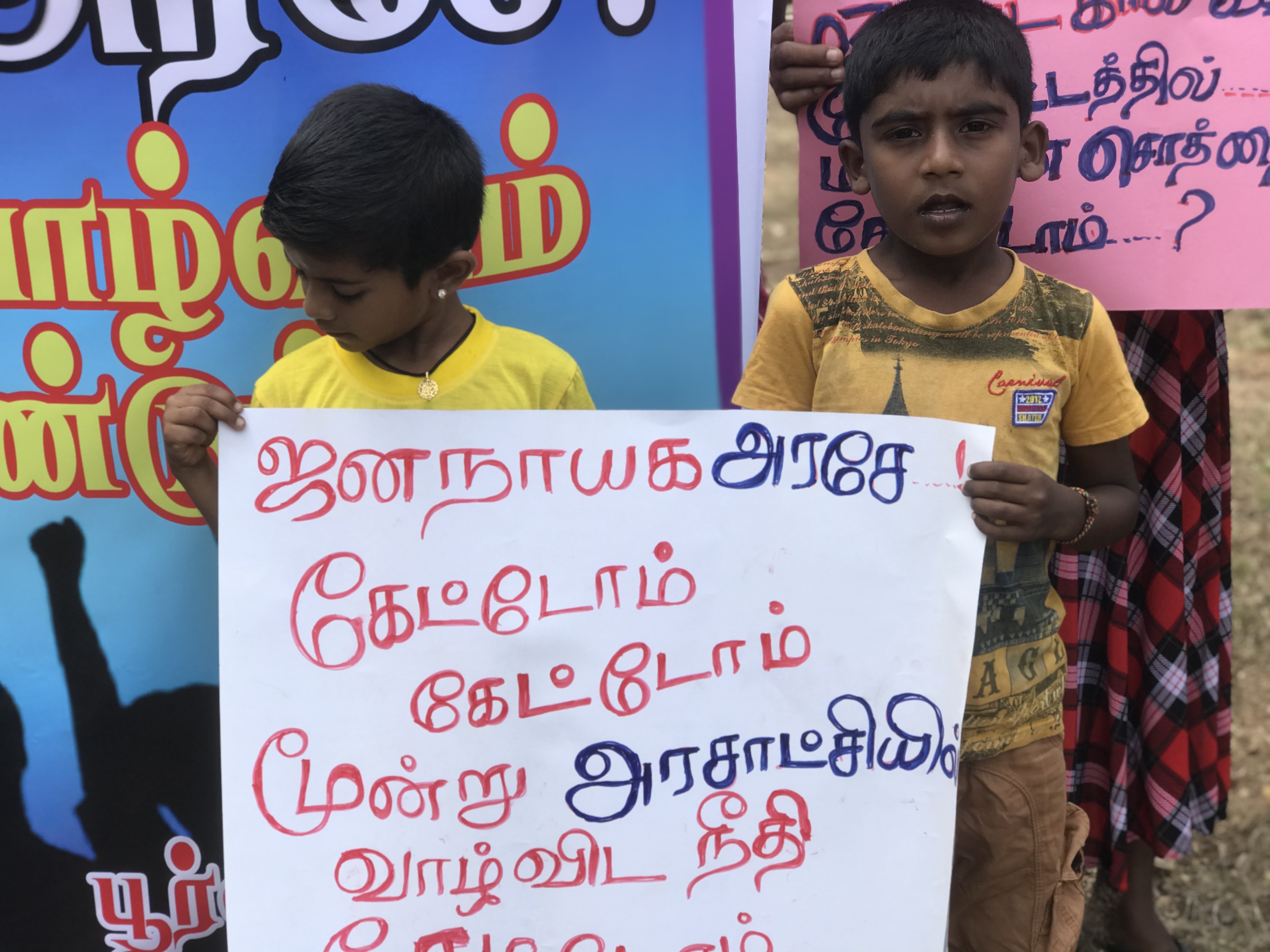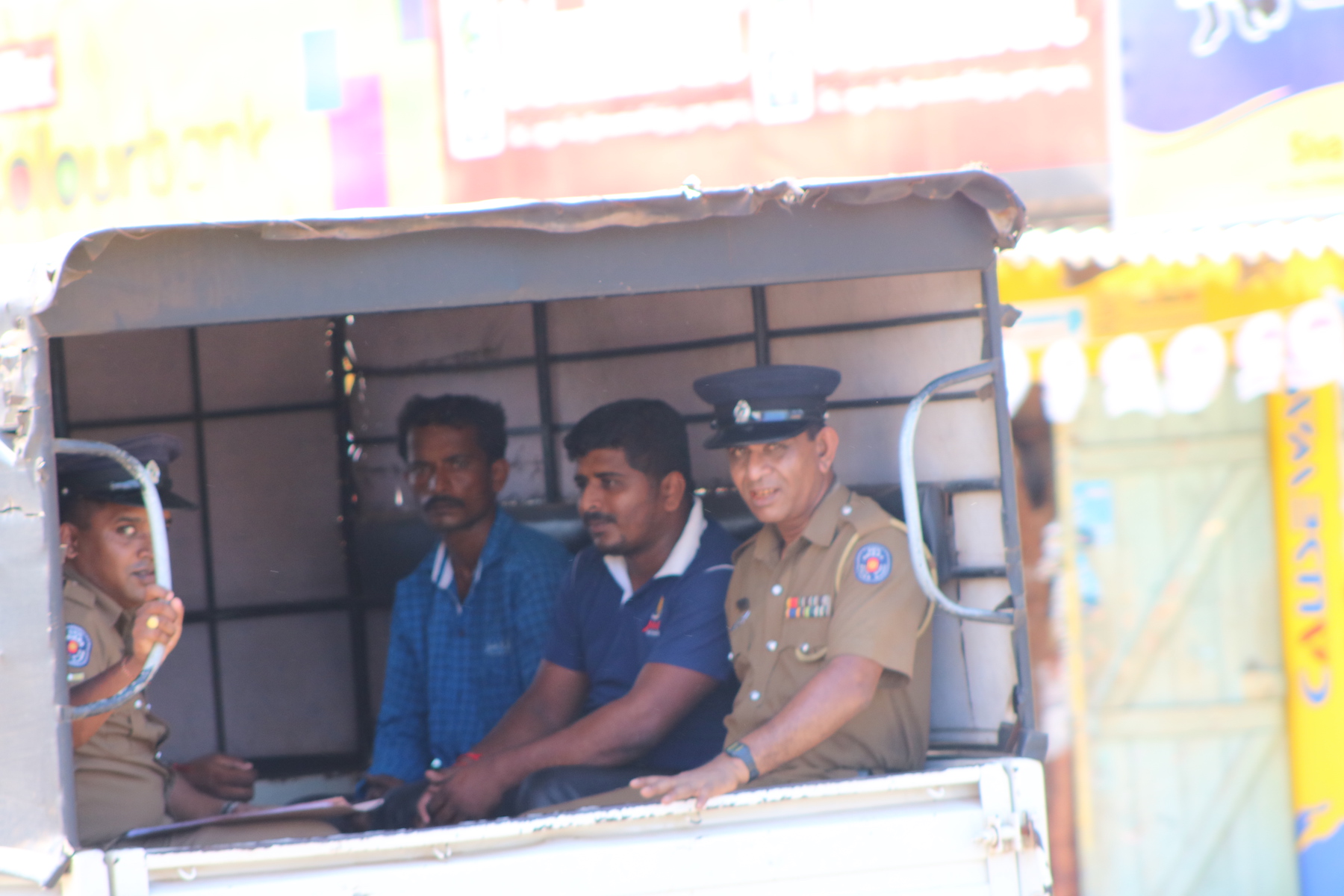The US State Department’s 2019 Country Report on Human Rights Practices in Sri Lanka highlighted a range of concerns this week, from unlawful killings and torture by government agents to the unjustified arrests of journalists and violence against lesbian, gay, bisexual, transgender, and intersex (LGBTI) persons.
Amongst the issues raised by the State Department was the harassment of Tamil journalists in the North-East, including of Tamil Guardian correspondents.
“Significant human rights issues included: unlawful killings by the government; torture by government agents; sexual abuse; arbitrary detention by government entities; restrictions on freedom of expression, including unjustified arrests of journalists and authors, and limited social media blocking; widespread corruption; violence against lesbian, gay, bisexual, transgender, and intersex (LGBTI) persons, and the criminalization of same-sex sexual conduct,” said the report.
See extracts from the report below.
Press freedom
Photograph: Thavaseelan accompanied by Sri Lankan police. April 20, 2019
“Journalists in the Tamil-majority North and East, however, reported harassment, intimidation, and interference from the security sector when reporting on sensitive issues related to the civil war or its aftermath,” the report stated.
“They reported the military contacted them to request copies of photographs, lists of attendees at events, and names of sources from articles. They also reported the military directly requested that journalists refrain from reporting on sensitive events, such as Tamil war memorials or land occupation protests, and that they feared repercussions if they did not cooperate.”
The report went on to highlight the harassment of two Tamil Guardian correspondents, Shanmugam Thavaseelan and Kanapathipillai Kumanan.
Thavaseelan was arrested by Sri Lankan authorities after a navy officer alleged he had been assaulted by the journalist, an accusation which the journalist firmly denies. Witnesses state that the navy officer had been threatening and photographing protesters at the disappearances rally that Thavaseelan had been covering at the time. The prominent Mullaitivu-based journalist was subsequently arrested and brought before the courts, as well as being summoned by Sri Lanka’s Terrorism Investigation Division (TID) for questioning in Colombo.
“Kanapathipillai Kumanan, who was covering a dispute between Hindu and Buddhist temples, was physically assaulted and verbally abused by the officer in charge of the Kokkilai police station,” said the US State Department. “According to RSF, the May 27 violence against the reporter was the third reported attack on a journalist of Tamil origin during the year.”
Torture
“The constitution and law prohibit such practices, but authorities reportedly employed them,” said the report.
“The Prevention of Terrorism Act (PTA) allows courts to admit as evidence any statements made by the accused at any time and provides no exception for confessions extracted by torture. Interviews by human rights organizations found that torture and excessive use of force by police, particularly to extract confessions, remained endemic.”
“In its report to the March session of UNHRC, the Office of the High Commissioner for Human Rights (OHCHR) noted it “has continued to receive credible information about cases of abduction, unlawful detention, torture and sexual violence by security forces, which allegedly took place between 2016 and 2018.””
Sri Lankan soldiers acquitted over gang rape of Tamil woman
The report went on to highlight the acquittal of four Sri Lankan soldiers over the gang rape of a Tamil woman, after they had been found guilty and sentenced for the crime in 2015.
“In October the Court of Appeal acquitted four military personal who were convicted and sentenced in 2015 to 30 years for the 2010 gang rape in Vishvamadhu,” it said. “While the rape happened in 2010, the men remained free on bail and were not convicted and sentenced until 2015. The basis for the acquittal was that the accused were not properly identified by witnesses. The victim’s lawyers appealed the decision on November 20.”
The four soldiers from Sri Lanka’s 572 Brigade, identified by The Island as P. I. Sunasinghe, D. Dhammika Pushpakumara, Priyantha Kumara and one other soldier, had initially been found guilty of raping the 27-year old Tamil mother of two in Kilinochchi in 2010, by the Jaffna High Court in 2015. They had been sentenced to at least 25 years imprisonment.
A report by Yasmin Sooka, The Bar Human Rights Committee of England and Wales (BHRC) and The International Truth & Justice Project (ITJP) previously detailed the incident, which involved the soldiers sexually abusing another Tamil woman. The report said:
"When the victim, who could identify the alleged perpetrators, reported the crime to the local military camp, she was told to have a bath first. Then she was offered money by the military to go away but she insisted on lodging a complaint with the police. A judicial medical report confirmed sexual assault. At a court hearing in which the victim identified her attackers, there were reportedly a hundred military men present to intimidate the victim. The accused were arrested but released on bail after five months. Since then, one has been absconding from the hearings, while the victim has been repeatedly harassed and threatened by military and police, most recently in February and March 2014."
See more on that case here.
Sri Lanka's courts
The report also highlighted systemic issues in Sri Lanka’s justice system, such as the “shortage of court-appointed interpreters” which it said “limited the right of Tamil-speaking defendants to free interpretation as necessary”.
“In several instances, courts tried criminal cases originating in the Tamil-speaking north and east in Sinhala-speaking areas, which exacerbated the language difference and increased the difficulty in presenting witnesses who needed to travel. Few legal textbooks were available in Tamil.”
Land occupation
The State Department acknowledged that the amount of remaining land occupied by the Sri Lankan military was “in dispute” and went on to state “many of those affected by the HSZs complained that the pace at which the government demilitarized land was too slow, that the military held lands it viewed as economically valuable for military benefit, and that military possession of land denied livelihood to the local population".
“According to the acquisition notices, while most of the land acquired was for use as army camps and bases, among the purposes listed on certain notices were the establishment of a hotel, a factory, and a farm. Some Hindu and Muslim groups reported they had difficulty officially claiming land they had long inhabited after Buddhist monks placed a statue of Buddha or a bodhi tree on their property, and described these acts as part of a ‘colonialization’ plan to dilute the concentration of minorities in the North.”

The report comes as families of Keppapulavu in Mullaitivu rallied last week marking 3 years since they started protesting for the release of their land from Sri Lankan military occupation.
Academic freedom
“The government interfered with university appointments and credentialing of individuals based on legal activities and political expression,” it added.
The report highlighted the case of Kumaravadivel Guruparan, the head of the Department of Law at the University of Jaffna. Last year, the University Grants Commission of Sri Lanka (UGC) to decided to debar him from legal practice.
“Leaked letters from the Ministry of Defense to the UGC showed that Guruparan was debarred for pursuing habeas corpus cases filed in 2017 by three families regarding the disappearance of 26 youths in Jaffna allegedly involving the military,” the report said. “Plainclothes military intelligence personnel travelling with Attorney General Department representatives threatened the lawyers and families outside of the court.”
The US also highlighted the case of Jaffna university’s vice chancellor, Ratnam Wigneswaran, who it says was removed “ without cause or an inquiry“.
‘Systematic discrimination’
“Both local and Indian-origin Tamils maintained that they suffered longstanding, systematic discrimination in university education, government employment, housing, health services, language laws, and procedures for naturalization of noncitizens,” the report concluded.
“Throughout the country, but especially in the North and East, Tamils reported security forces regularly monitored and harassed members of their community, especially activists, journalists, and former or suspected former LTTE members.”
See the full text of the US report here.
We need your support
Sri Lanka is one of the most dangerous places in the world to be a journalist. Tamil journalists are particularly at threat, with at least 41 media workers known to have been killed by the Sri Lankan state or its paramilitaries during and after the armed conflict.
Despite the risks, our team on the ground remain committed to providing detailed and accurate reporting of developments in the Tamil homeland, across the island and around the world, as well as providing expert analysis and insight from the Tamil point of view
We need your support in keeping our journalism going. Support our work today.
For more ways to donate visit https://donate.tamilguardian.com.


